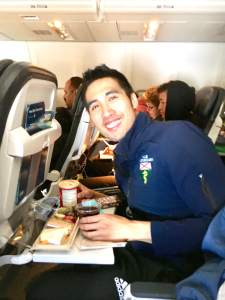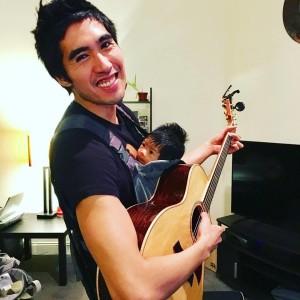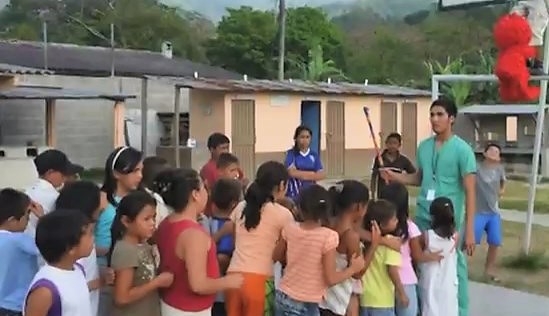‘Is there a doctor on this flight?’ Yes, a Filipino, and he’s good

Dr. Lawrence Lipana enjoys a hearty breakfast after attending to a medical situation on his flight to Newark, New Jersey. CONTRIBUTED
OAKLAND, California — Suffering from sleeplessness, hungry and tired from a memorial service and funeral for his father-in-law, Filipino physician Lawrence Lipana was aboard an Alaska Airlines plane from San Jose International Airport to Newark International Airport in New Jersey when duty called.
Thirty minutes after takeoff, the flight crew announced the need for a medical doctor or a nurse practitioner on board because a girl passenger was experiencing shortness of breath, light-headedness and abdominal pain.
As no one else was responding to the call, Lipana got up and made sure that he properly presented his Yale health insurance ID that has MD after his name. He was well aware that he’s very young looking and some people may have issues with minority physicians’ legitimacy.
“I was also wearing my jacket that said ‘Yale Anesthesiology’ on the front. The crew looked at my ID and introduced me to the family as a physician, although I was I nervous because this was my first time on the plane where I was the only physician,” recalls Lipana.
Now in his early 30s, Lipana has been a board-certified pediatrician for five years aside from being a resident anesthesiologist at Yale University. “I reassured myself because I knew that my experience in pediatrics, which was heavy on primary and diagnostic care and complemented my anesthesiology training with emphasis on procedural work, critical care.”
It helped a lot that the crew had wisely given the passenger oxygen while waiting for medical personnel and had brought out their medical kit with basic equipment to take vitals, give oxygen and administer lifesaving medications by mouth or intravenous (IV) infusion.
“The first big question was the need to start resuscitation now or take a history. Since she appeared stable on initial assessment, I proceeded to get a history from the patient and her family. Another big question I asked myself was: Do we need to prepare for an emergency landing since flight medicine is different because of limited equipment and diagnostic ability? But based on my queries and physical examination, I made sure to rule out any causes that may require immediate transportation to a hospital, so emergency landing was not needed,” Lipana recounts.
Soon, he was also talking to an emergency room physician, whom he needed for consultations, via a radio that the pilot and the crew had hooked up.
“This was important because this opened the door to many medical professionals being able to provide adequate care for a patient (aboard an airplane). Knowing that the pilots, crew and ground medical staff were on my side, I felt comfortable that we could work as a team. The ER physician, who was more comfortable with drugs commonly present on the plane, advised which ones to give her. I gave her that and provided hydration before returning to my seat,” Lipana explains.

As a new Daddy to her daughter is one role that Dr. Lawrence Lipana cannot “sign off” from. CONTRIBUTED
Lipana was called back again because the same patient was experiencing a new set of symptoms and turned out to be suffering mild, transient side effects of the initial medicine. He sat with her in the first class section, taking serial vital exams and providing additional hydration, only returning to his seat when all her symptoms were resolved.
The ER doctor on the radio was so impressed with Lipana that he jokingly asked if Lipana could be on all the flights he was in charge of. It would have impressed him more if he knew that the Philippine-born Lipana was a pre-med magna cum laude University of California in Los Angeles graduate and a Gold Humanism Honor Society as well as a Phi Beta Kappa in 2008 before going to UC Davis for medical school from where he graduated.
“If I was not there, I am not sure what would have happened. They still would have gotten the ER doctor on radio with someone, either the crew or another passenger, taking vitals and monitoring the patient closely,” Lipana says. “Since the plane was somewhere near Colorado/Utah, an emergency landing and take-off would have canceled the rest of the flight or at least caused a two to three-hour delay.”
Among the lessons learned by Lipana was that everyone on the flight, especially the pilot and the crew, becomes part of your medical team; to keep one’s medical skills sharp, to be nice and professional always, and that the most important thing the crew could do was to get the supplies ready and an ER doctor on radio.
“I knew that a situation where I was the only physician would happen eventually, so I’m glad this incident worked out for everyone,” says Lipana. “I don’t regularly prepare myself, but responding to this particular airplane call I came up with a game plan for resuscitation and anticipated potential roadblocks like needing to prove my MD legitimacy and the limitations of the on-flight first aid kit.
When asked if he had no reservations in helping out in the wake of how a Vietnamese-American doctor was violently thrown out of an overbooked flight that made headlines worldwide, Lipana responded that people would usually have a race, gender and age bias, so any health professional should anticipate that problem.

Dr. Lawrence Lipana regards joining medical missions and outreach programs like this one in the Philippines as one way of giving back to his roots. CONTRIBUTED
“They should not be shocked when questioned, but instead act in a way that pulls people in during times of distress, instead of cause additional chaos. I knew that in order to gain everyone’s trust, I needed to show sufficient identification and demonstrate my medical knowledge and procedural skills set while acting in a way that was pleasant, calm and confident.”
He thinks Filipinos, with their family values and hospitality, are a natural fit in healthcare. “Llike many overseas Filipino workers (OFW) we have been taking care of our families for a long time.” Lipana has also served in medical mission trips and outreach missions to the Philippines and Honduras.
The airplane incident is a “fun and fulfilling” experience that he likes to share with friends. “I think the biggest thing is knowing that I have been blessed to learn a craft that can readily help others in any situation,” Lipana acknowledges.
That fateful flight was quite special for a boy who, living along the banks of the Zapote River in Bacoor, Cavite, loved climbing up the roof of his house to count the planes that passed by. He had hoped that someday he could be aboard one of those planes in his quest for a better future. It turned out he would be able to do that and more.

